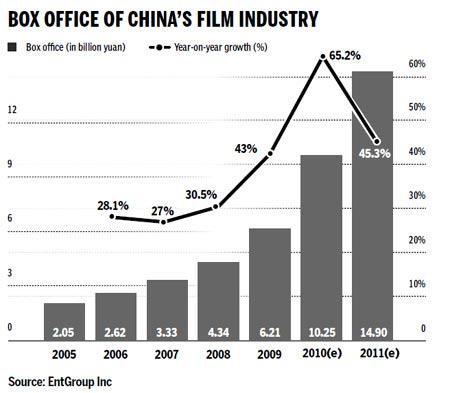
BEIJING - China, a country where 300 million people are said to be able to afford movie tickets, is in the middle of a cinematic boom with many businesses turning their attention on investing in theaters.
"Not only have many cinema owners expanded their cinema network, but also other companies such as real estate developers and media companies are getting involved in opening multiplexes," Liu Xiuwen, deputy secretary-general of the China Film Association, said.
Up to the end of last year, there were about 4,700 cinema screens throughout China, a country with about 1.4 billion people.
However, in just the first six months of this year, almost 600 new screens, in about 150 new theaters and multiplexes, came on line, EntGroup Inc, a consulting company to the film and entertainment industry, said.
This growth is fed by an ever-increasing flow of new films, from China as well as from overseas. Last year, the Chinese movie industry produced 456 films, an epic jump from just 38 produced in 2002.
And box office successes from overseas, such as Avatar and Alice in Wonderland have also fueled the Chinese appetite.
Box office takings are also on the rise and is expected to exceed 10 billion yuan ($1.4 billion) this year, compared with 2 billion yuan five years ago, said Tong Gang, director of film administration bureau in the State Administration of Radio, Film and Television.

And this is despite the fact that cinema tickets are not all that cheap when compared with the average wages. For example, the average ticket price is 32 yuan where the average wage is about 16,000 yuan a year, figures from the National Bureau of Statistics show.
Xu Xiaoping, general manager of Shanghai United Cinema Lines, said government policy is also another reason for the rapid growth in multiplexes and cinema screens.
"Owners of multiplexes with four or more screens in large cities including Beijing, Shanghai and Chengdu can get 300,000 to 500,000 yuan for every additional screen," Xu said. "This is a huge encouragement and support to promote the development of China's film industry."
Cheng Guangyan, general manager of marketing department in China Film Cinema Investment Company, said the country's film industry has great potential, with only one screen for every 200,000 people.
In the US, the ratio is one screen to every 3,000 people, she said.
"The demand for entertainment is being met with a boom in cinema construction, but companies, especially those without any experience of running cinemas, should be very cautious," Cheng said.
"Cinemas are not risk-free investments, and rapid expansion also means high risk."
Building a cinema is not cheap, each costing between 20 million yuan to 30 million yuan in larger cities such as Beijing, Shanghai and Shenzhen, and perhaps half that in smaller cities. Cinemas, usually equipped with the latest in technology, including Dolby DTS sound systems, three dimension (3D) capability and IMAX, are generally between 200 and 500 seats.
With such rapid growth, the film market will likely to be fiercely competitive in about three or five years. In contrast Chinese moviegoers are only a small group of people aged between 18 to 30 years, she said.
"The risk is that the number of Chinese moviegoers may not catch up with the rapid growth of screens," Cheng said, adding that it might take an investor four to five years to break even.





